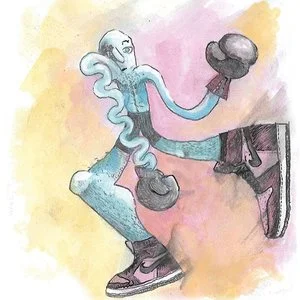You have to admire Star Wars for making an entire film just to fill in a plot hole from 40 years ago.
Why would they make the Death Star with such a obvious and silly weakness? It’s a question Star Wars fanatics whispered (and Star Wars detractors shouted) for years, and now we finally have an answer. Built around the Death Star’s origin and the endeavor of revealing and understanding it, Gareth Edwards (Godzilla)’s Rogue One: A Star Wars Story predominately follows the quest to steal and transmit home the battle station’s plans and the surprisingly nuanced dynamics behind them. Without giving too much away, in doing so it includes what might be one of the light side / dark side transitions with the most humanizing depth in the entire series.
Whereas last year’s Episode VII: The Force Awakens at times watched like a tired reboot of Death Star III, Rogue One manages to combine the inherent nostalgia and predetermination of a prequel into something almost paradoxically fresher. You know the conclusion from the start, but the thrill of figuring it out along the way feels new enough to make you forget, and it’s justified by being a clarifying look into the past, not a repetition of the future. The ease with which longtime fans will be able to use Rogue One to introduce younger fans to the original trilogy is also a romantic touch as well, as the films connect nearly seamlessly, and, despite there being not one lightsaber on lightsaber battle in the full 133 minute runtime, and despite stealing a glorified flash drive being a far less explosive end goal than destroying the Death Star, Rogue One undoubtedly does enough to bring in new fans while satiating the old. After all, desperately attempting to connect to a network with which to transfer files is an amusingly 21st century problem for “a long time ago…”
When discussing the cast it’s important to first note that while Rebel Alliance leader Mon Mothma famously claimed, “Many Bothans died to bring us this information,” when discussing the Empire’s plans for a super weapon in the original trilogy, contrary to popular confusion this actually took place in Return of the Jedi regarding Death Star II, and is not in reference to the trials and tribulations depicted in Rogue One. Therefore, while there is perhaps a disappointingly light representation of non-human characters, the lack of furry spies capable of invisibility that has been bemoaned by classic fans is not actually all that contradictory to whats canon. (New directors and writers have the right to stamp a healthy originality on the project, but come on, it wouldn’t have hurt to throw a few Bothans in there.) These, these are the “rebel spies” mentioned way back in the very first crawl in ’77.
But how do you create character development in a story in which, from the beginning, it’s pretty clear none of the characters will survive due to none of them appearing in any of the four chronologically subsequent movies? Well, in some cases you don’t. Much of the diverse cast, including the blind martial arts master type Chirrut Îmwe (Donnie Yen), the deadly warrior Baze Malbus (Jiang Wen), the Imperial pilot defector Bodhi Rook (Riz Ahmed), and the sardonic reprogrammed Imperial droid companion K-2SO (voiced by Alan Tudyk), are explored or grow very little if at all through dialogue often unremarkable beyond quips, and some (Îmwe and Malbus) die in predictably overdone action movie fight scenes that cheapen their existence even more than their underdeveloped beginnings.
That being said, it’s easy to imagine the film dragging had much more detail been added to people who, ultimately, leave the stage as quickly - and, in the big picture, somewhat insignificantly - as they come. The Force sensitivity of Îmwe, for example, can read as both an intriguing inclusion in a Jedi-purged world that showcases the countless disparate incarnations of The Force beyond its popular lightsaber-wielding polarization, or as a lukewarm substitution for the only film in the entire series that lacks a single Jedi presence and only barely shows any of the Sith at all either. Main protagonist Jyn Erso (Felicity Jones), however, does well in following up The Force Awakens’ introduction of strong female leads to the Star Wars universe while rebel assassin Cassian Andor (Diego Luna) offers a strong foil without succumbing to any romantic predictabilities.
Many of the film’s biggest flaws tie into the aforementioned action movie trope traps, but the majority were previously present through the Star Wars universe and are being faithfully continued here. For example, AT-ATs are still entirely inefficient, uselessly lumbering objects that cannot justify their production with a couple cannons on the head of an unnecessarily large elephant body, especially considering they struggle to hit even fleeing soldiers running in a straight line below them. (Also, if X-Wing fighters can destroy them so easily, where were they during the battles on Hoth? But I digress.)
On the flip-side, Rogue One also surprises with one of the most clever tactical moves ever shows in a Star Wars battle, with the Rebels using a ship as a tugboat to push a disabled Star Destroyer into another and, finally, into the shield generating station. Similarly, the detailed destructions of the Death Star’s first targets, merely whole cities on Jedha and Scarif, hit harder than the quick death scene of the entire planet of Alderaan in some ways, much like an intimately visualized paper cut might create a more visceral sensation of pain than a basic gunshot shown on a wide angle. Still, with most deaths coming from blaster fire or only alluded to, there is very little actual pain shown at the scarring levels of writhing under Force lightning or lightsaber lacerations, making the claims of Rogue One being the least child-friendly episode largely unfounded when if anything the opposite seems more true.
Fan service is present in the brief but notable glimpses of C-3PO and R2-D2 (rest in peace, Kenny Baker) and in trivial bits such as with the blue milk first seen on Tatooine and (a deep cut) the reappearance of Ponda Baba and Colonel Evazan, whom extra-dedicated viewers may remember as the bullies who harassed Luke in the Mos Eisley Cantina much like their passing altercation after coincidentally bumping into Jyn and Cassian on Jedha seven movies later. Most impactful (though setting a controversial precedent), however, is the CGI-assisted representations of past faces not as easily replicated; a young-again Princess Leia’s closing words and Grand Moff Tarkin’s (also rest in peace Peter Cushing) several reappearances were crucial to the storyline and benefitted greatly from the unavoidable awkwardness that comes from a different actor taking one out of the magical world created by cinema.
The modern ability to render gorgeous scenes from Scarif’s lush landscape all the way up to the impressive shield setup and space battle above it makes Rogue One a film you can't tear your eyes away from, yet the subtle reminiscence of Edwards pushing extras to grow out their mustaches and sideburns in the ‘70s style of the OT gives the flashy exterior an admirable authenticity. One area in which the film inexplicably misses an easy crowd pleaser? No opening text scrolling through space.
In an age beset by international terrorism and unrest in the Middle East, the depiction of Saw Gerrera (Forest Whitaker)’s splinter rebel faction veers so close to ISIS or Al Qaeda that it becomes impossible to ignore. The desert setting, guerrilla tactics, Islamic-style attire, and “militant,” “extremist,” and “insurgent” labels forge an undeniable connection, further deviating from a good versus evil simplicity while fueling the devil’s advocate thinkpieces about the Rebel Alliance and the Jedi who fight with them being anti-hero religious extremists within a terrorist organization. With this Rogue One does well to make an otherwise opaque conflict increasingly complex, interesting to dissect, and in some ways, realistically relevant.
Furthermore, the revelation that the Death Star’s planet killing strength is derived from Kyber crystals, the same source used in lightsabers and adorned on Jyn’s necklace, is a powerful poignancy that subtly sums up the duality of the force. That which creates light also fuels darkness and can be exploited by both simultaneously - just like The Force as a whole and, as discovered later on, specifically the Death Star’s plans themselves.
In many ways, being an anthology film unbound by linear trajectories into the unknown or being tasked as the first reboot of familiar characters gave script writers Chris Weitz and Tony Gilroy a benefit The Force Awakens didn’t have. That being said, The Force Awakens also has the benefit of the doubt in needing to be judged as a part of the trilogy it has begun, whereas Rogue One was limited to completing its cast’s brief, and comparatively shallower character arcs in just over two hours. Ultimately, Jyn and Cassian will never reach the canonical importance or popular staying power as Daisy Ridley’s Rey or John Boyega’s Finn, but their role in the Star Wars universe may well have proven more important. In any case, Rogue One couldn’t rely on the crutch of uncertainty - it needed an ending. What we get is overall a satisfactory one, not least when considering it begins the most beloved movie trilogy of all time.























